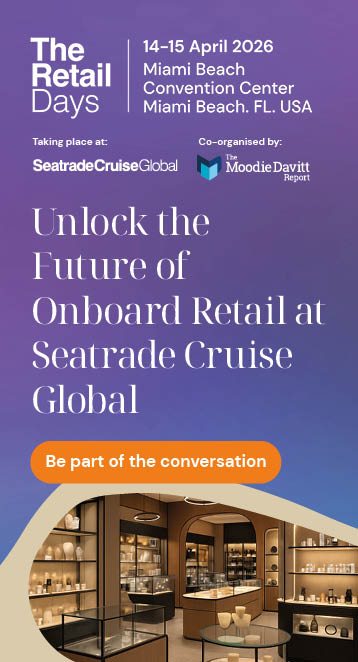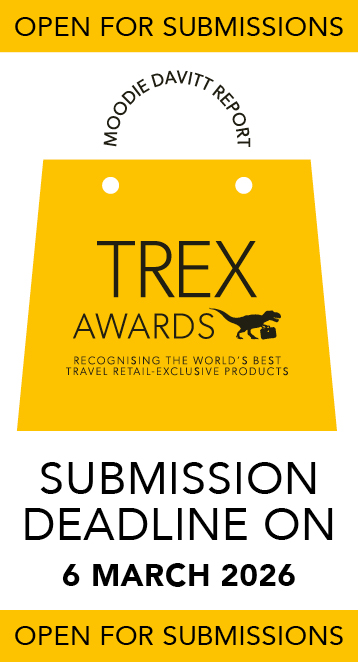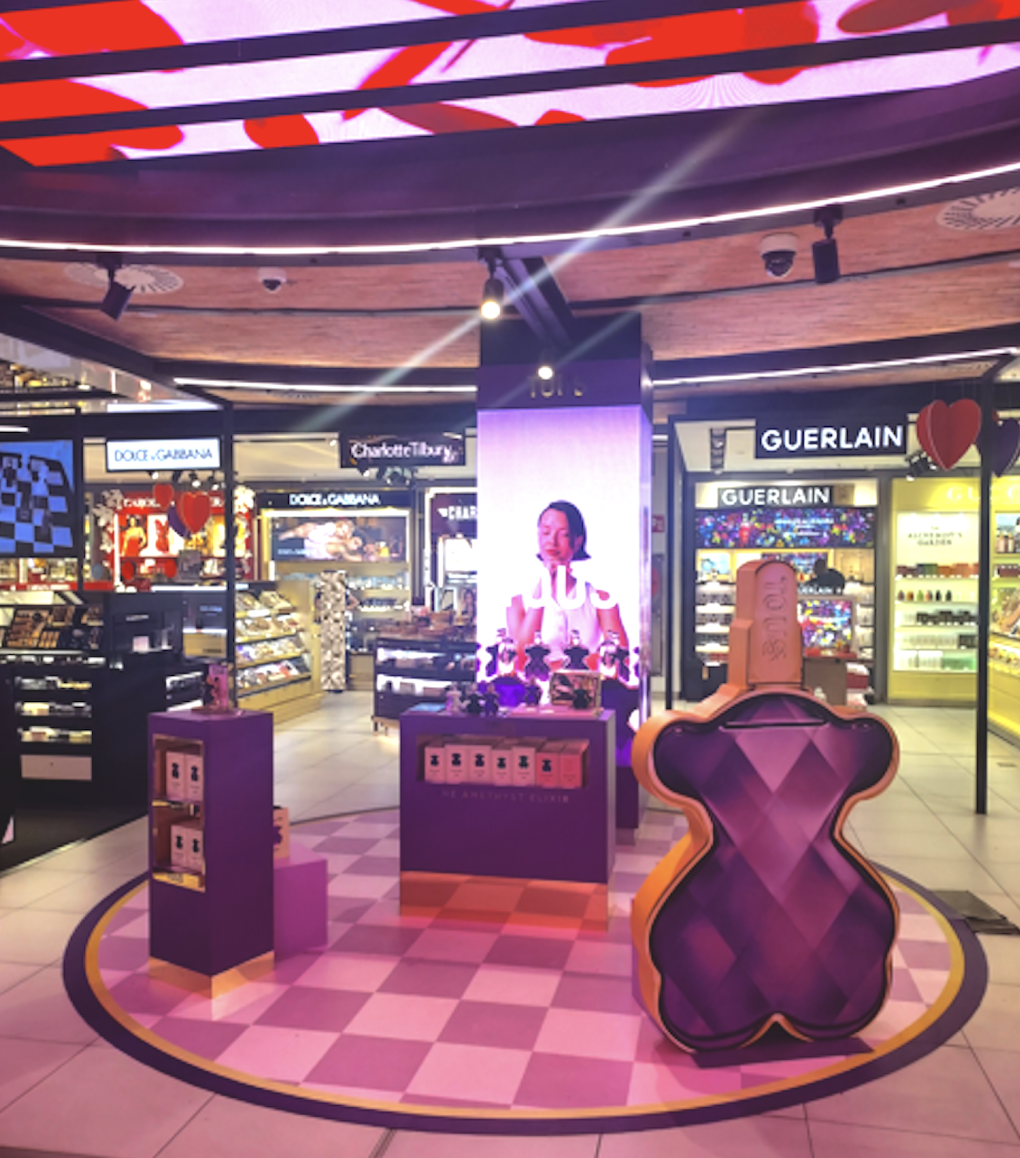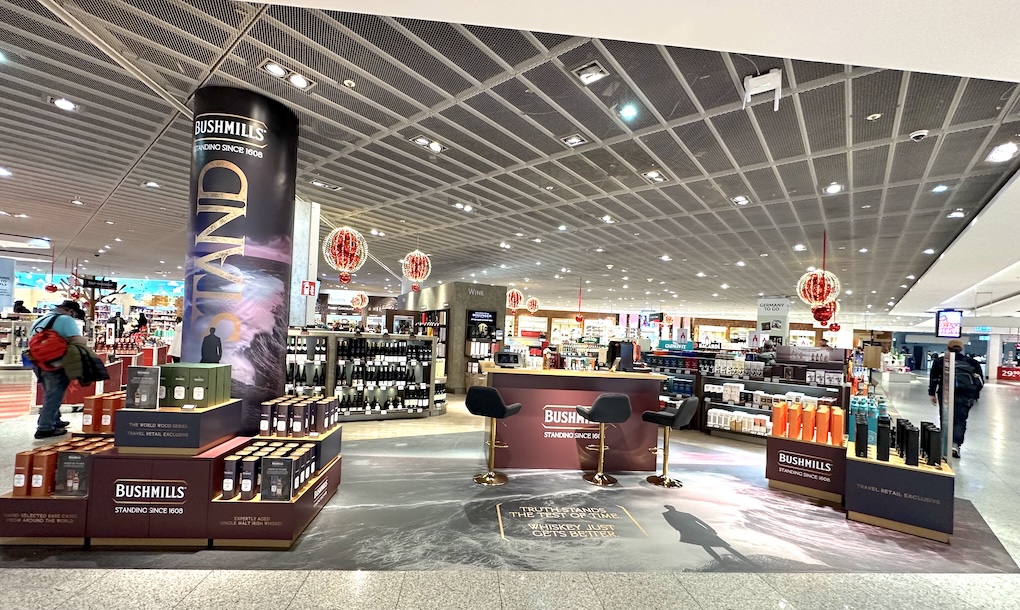
| Leveraging a different kind of non-aeronautical opportunity As with their more traditional counterparts, Urban Air Ports offer plenty of opportunities to develop non-aeronautical revenues, according to Urban Air Port founder and Executive Chairman Ricky Sandhu. “In Coventry, we will have our hospitality and retail strategy for both quick connects and passengers who arrive early for their flight,” he says. “We will be the first people in the world to be integrating that level of service into this kind of infrastructure. “We are going to have what we call the Urban-Air Port Café which will be at the centre of our passenger air taxi lounge. That’s going to be really important – we want people to feel comfortable and realise how similar some of the processes will be for this new type of transportation technology to what they are used to when they go to a conventional airport. “But it’s not just about the F&B side, it’s also about the retail opportunity. There’s a lot of ‘instant gratification’ types of retail experience, there’s a lot of brand exposure and whilst we are a new type of aviation technology, the same kinds of opportunities apply, so we really welcome the participation from your readers and from brands and operators to engage with us. “We have already had, through our media launch, an audience of four billion people in the last few weeks. That’s phenomenal, the level of interest is massive, we have been covered on CNN and all over the world – even by The World Economic Forum. “It’s a really exciting opportunity and in our air taxi lounge, people will experience an entirely new type of space with the Urban Air Port café, a unique retail experience and exposure to brands in a completely new way – all of this means non-aeronautical revenue as well for us.” He points out that the opportunities are not just in selling – for an Urban Air Port will be a fraction of the size of a traditional airport – but also in showcasing brands. “I think to be represented at the Urban Air Port is going to be really important for brands because it’s such a new and exciting thing, so it presents a phenomenal opportunity. Also, the whole consumer trend will be linking our future passengers via our app. You can download the app and book your flight; the airport will know that you are coming, so there’s a whole opportunity for online brand exposure. “When you’re sitting in the airport café and having your macchiato and your sandwich – you will see the product being showcased in the Urban Air Port and can order it via the app. “So the opportunities are huge. We are really excited to be growing our retail and hospitality team, which is why Keith Hunter and Nick Palmer [Co-founders of Hunter Palmer Global Retail Solutions ] will be working alongside us to help develop that entire strategy.” |
UK/INTERNATIONAL. At a time when travel retail is reeling from the crippling restrictions on its usual lines of business, the emergence of a bright new travel-related sector – which might see thousands of mini airports springing up across the world over the next decade (yes, you read that right) – could soon be snaring the attention of advertisers, brands, retailers and food & beverage concessionaires.
As The Moodie Davitt Report recently revealed, Urban Air Port Air-One – to be launched in Coventry in the Midlands of the UK later this year – will be a world-first fully-operational hub for future electric vertical take-off and landing (eVTOL) aircraft such as cargo drones and air taxis. It is step number one in a sequence of developments that is set to open up a world of new airport-related opportunities for some businesses that feed off the currently COVID-19-ravaged aviation industry.
“I think to be represented at the Urban Air Port is going to be really important for brands because it’s such a new and exciting thing, so it presents a phenomenal opportunity”
The partnership behind Urban Air Port Air-One – which includes London-based start-up Urban Air Port and South Korean automotive giant Hyundai – has won £1.25 million (US$1.8 million) in funding from the UK government’s Future Flight Challenge programme to develop aviation infrastructure and systems for the next generation of electric and autonomous air vehicles.
The Air-One project aims to bring industry, government and the public together to unlock the potential of sustainable urban air mobility, providing seamless passenger journeys and deliveries, while reducing congestion, cutting air pollution and decarbonising transport.
The Urban Air Mobility Division of Hyundai Motor Group has chosen Urban Air Port as its priority infrastructure partner. The Seoul-headquartered business, which plans to create its own eVTOL aircraft, is supporting the development of Air-One as part of a plan to commercialise its aircraft by 2028.
NASA has predicted that urban-air mobility in the US alone could be worth up to US$500 billion in the near-term. However, a barrier to market growth is the lack of infrastructure, an issue which Urban Air Port founder and Executive Chairman Ricky Sandhu established his company to resolve.
Aviation experience
Sandhu’s background is in architecture and design and he spent 16 years as a partner at the globally renowned London firm Foster + Partners. He says: “I opened offices around the world for them, the last one was in Qatar. I was the partner responsible for the Hamad International Airport expansion, home of one of the fastest-growing airlines in the world, Qatar Airways. I led the design and development for over a year in London, before moving to Qatar to head up its construction for two years working closely with the Group CEO Mr Akbar Al Baker.”

Sandhu has since been involved in other big airport expansion plans, including London Luton Airport in the UK and New York JFK in the US as well as developing new innovative solutions for aviation infrastructure and processes. That experience includes working closely with AirPortr, the online luggage collection/check in technology company, and developing new on-demand robotic retail solutions.
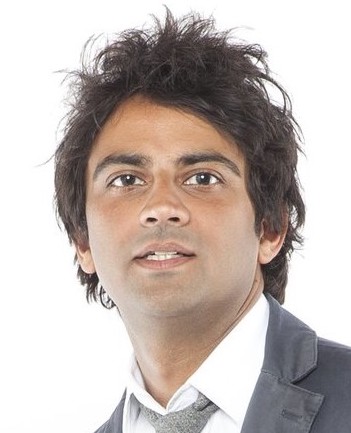
He also worked on a major city centre transportation hub project – called Slussen – in the centre of Stockholm, Sweden. It was Europe’s largest construction project at the time, and included a new pedestrian/road bridge, a hydrogen bus station, and rail, metro and marine infrastructure. All of this was carefully integrated with activated waterside cultural, retail and hospitality venues.
Transportation sustainability
Sandhu’s work here sparked a growing concern for, and interest in, the sustainability and integration of transportation in cities.
“The transportation sector has always been one of the most polluting sectors in the world,” he says. “We may see great advances in buildings and building technology to make buildings as efficient as possible including features such as rainwater harvesting, integrated renewable energy technologies, sustainable materials and zero waste and carbon strategies. But the bits in between these buildings – our streets – still have lots of inefficient and carbon intensive modes of transport that are polluting, cause congestion and result in poor air quality.”
Spying a major opportunity, he left Fosters and set up his own company, Six Miles Across London (Small) a name that, he reveals, was inspired by his old commute.
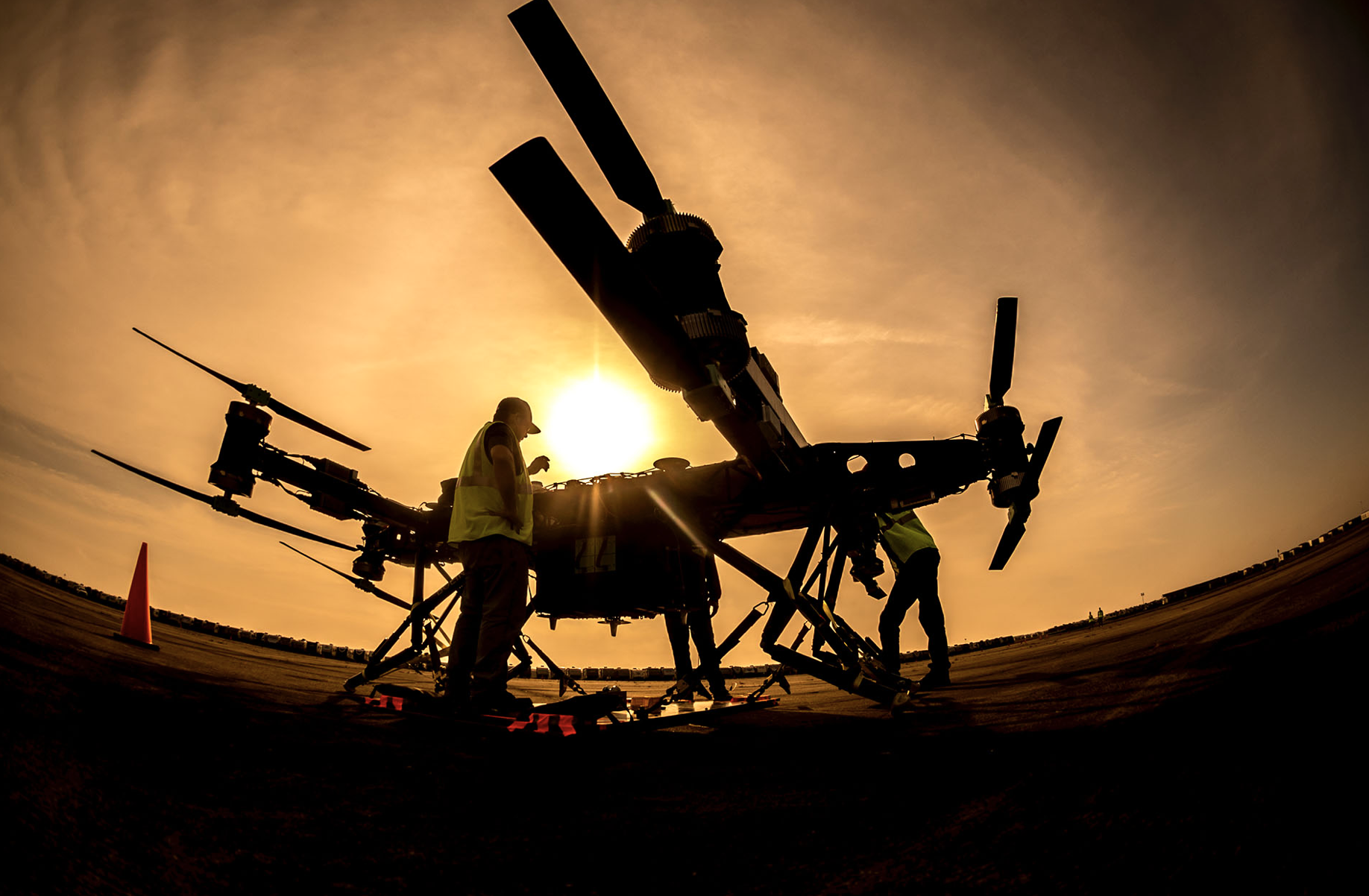
“The journey I took from home in northwest London to the Fosters office in Battersea was a six-mile journey which would take an hour by car each way through some of the most expensive real estate in the world. It was congested with lots of traffic and extremely poor air quality.”
In 2017, Sandhu’s company was approached by Airbus, which was developing eVTOLs and wanted to take advantage of his experience in the architecture of cities and airports. His work with the aerospace corporation led to the development of a design portfolio of different-sized urban air infrastructure facilities.
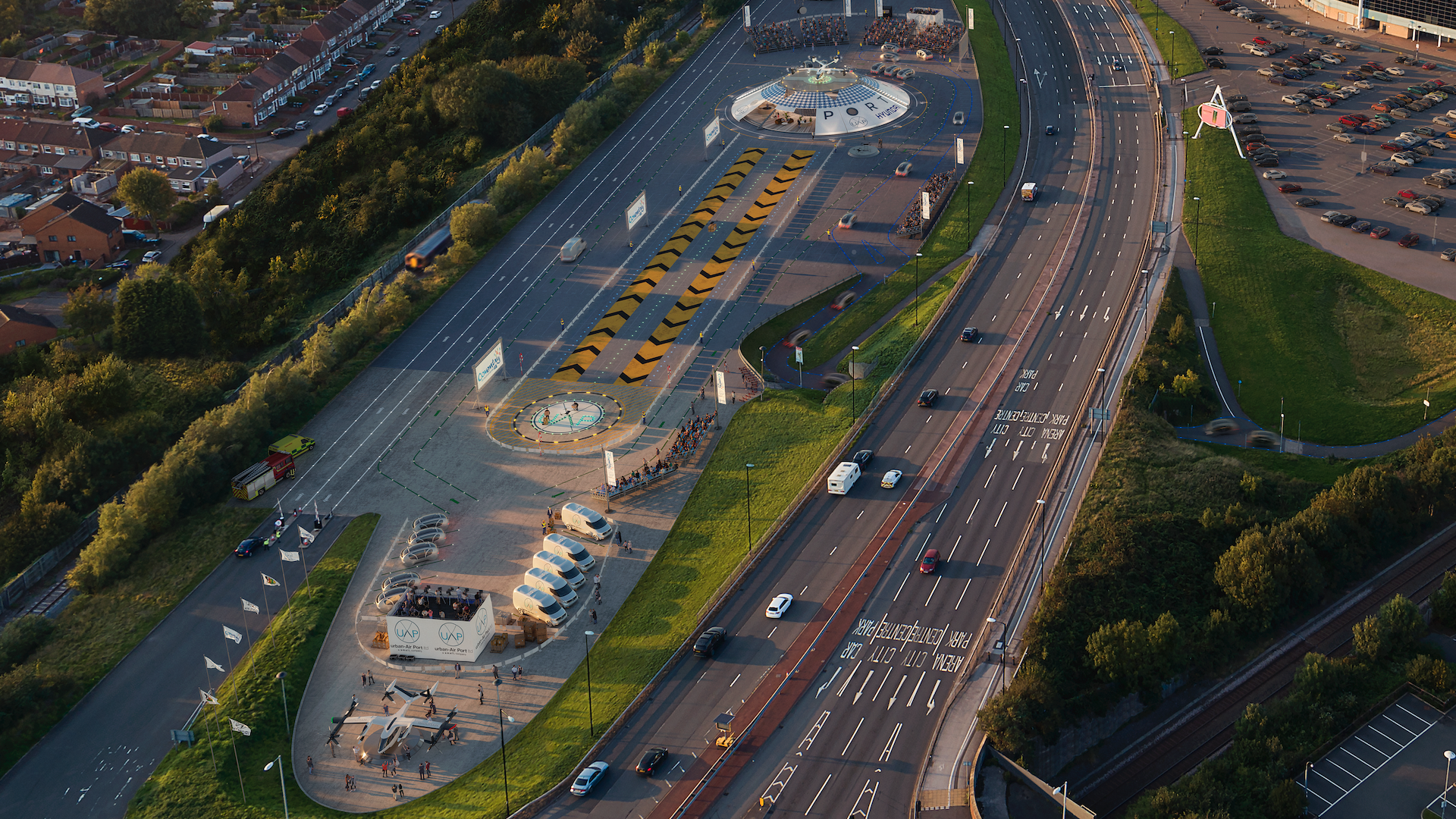
Seamless journey
“You need infrastructure solutions for the super urban core like Canary Wharf and downtown, through normal urban and suburban, all the way through to the countryside,’’ he says. “You need to have a range of different ways in which your vehicles can integrate with all the different transects of the built environment so that you can create a seamless journey. We now have a wide portfolio of different typologies of infrastructure for all types of autonomous aerial ability for air taxis and cargo logistics journeys.”
Against this background, Small formed a subsidiary, Urban Air Port, to focus on this infrastructure that the new technology would need for commercial take-off, by partnering with cities, regulators, stakeholders from the civil aviation industry and an original equipment manufacturers (OEM).
The OEM it teamed up with was Hyundai, the world’s fifth-largest vehicle manufacturer, which is investing US$1.5 billion in the sector and, of course, developing its own eVTOL vehicles.
“We were excited to connect with Hyundai because their vision aligns with ours, which is that it’s not just about the vehicle, it’s about having the full ecosystem that will enable that vehicle to operate,” says Sandhu. “When we first met, we shared our decks and they were pretty much identical in terms of vision and terms of strategy, so it was a no-brainer to form this unique partnership.”
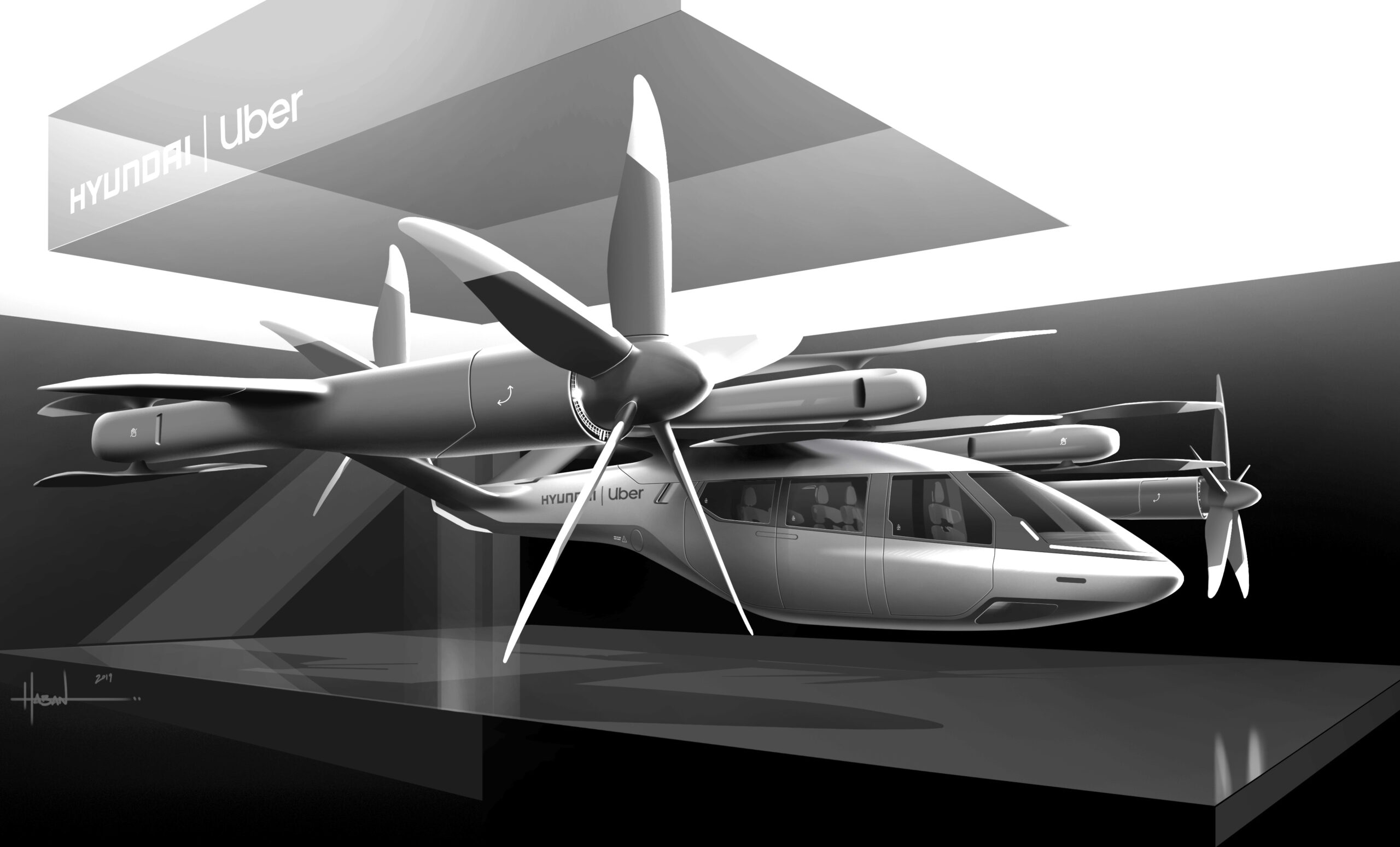
“Hyundai started as an infrastructure company, which began by building roads, then moved onto the vehicles. They understand that there is no point just focusing on the vehicle if there is no ground infrastructure being developed at the same time. The full ecosystem has to evolve now much earlier than when the first vehicle is ready to fly and that groundwork is what we are focused on.
“So we are taking a lot of the hard work away from the OEM so they can just focus on the vehicle and we can create the integrated and safe networks for them to fly from.”
Sandhu estimates that there are now almost 300 companies developing eVTOL vehicles and, while the most popular option is for electric-powered vehicles, range and speed issues have persuaded some to look at hydrogen-fuelled aircraft.
Showcase for electric flying
The plan for Coventry is to have a fully operational landing pad catering for air taxis and drones ranging from small to very large in size. Visitors will be able to see how the vehicles are charged, maintained and stored, and how cargo drones interface with the larger infrastructure. They will also be able to see how passengers are processed through the airport via an air taxi lounge to board a vehicle.
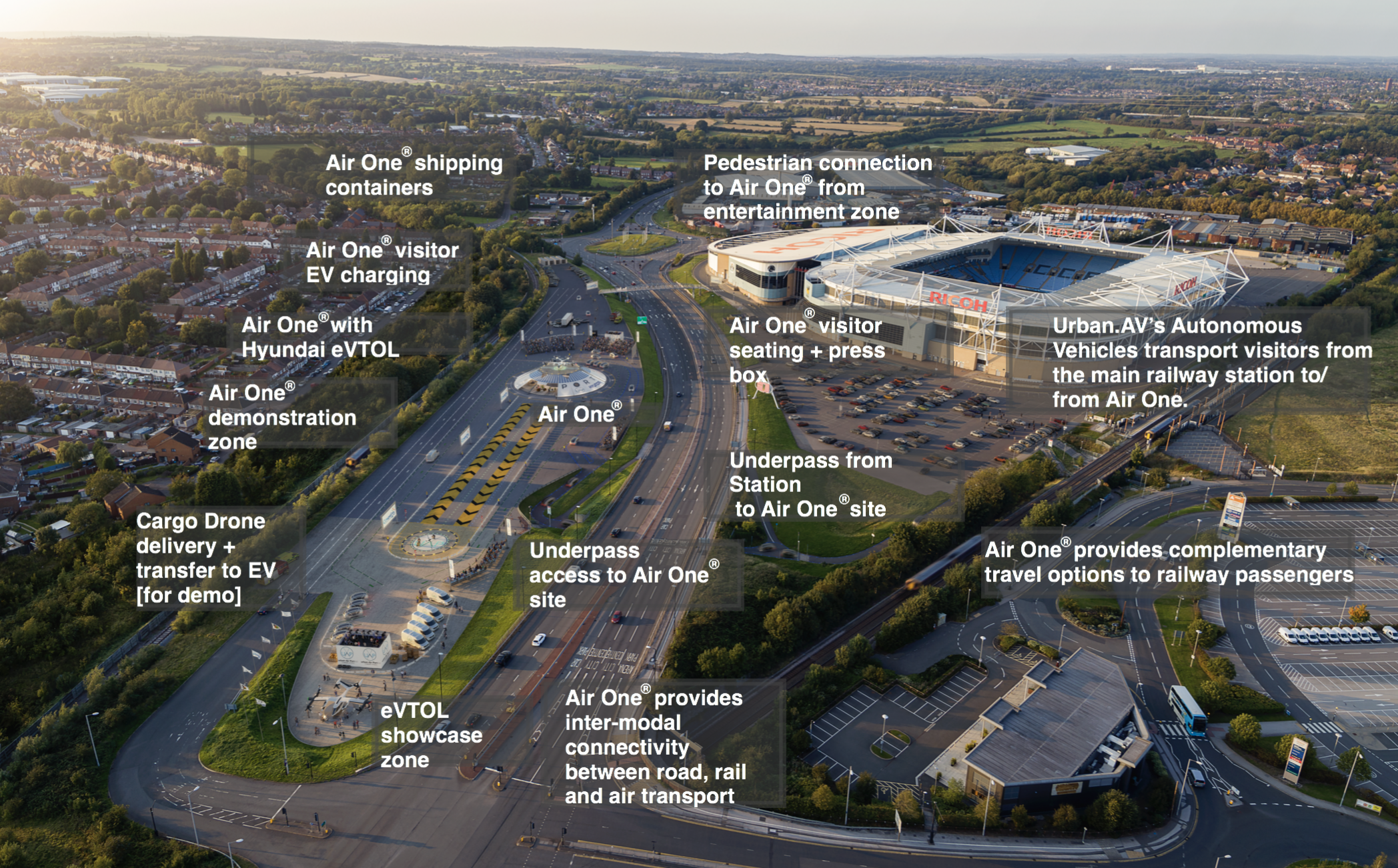
“We are investing in that to show people exactly what it will be like to go through the process and we want that to be a high-quality experience, even if dwell times are designed to be short for quick transfer from other modes of complementary transport,” says Sandhu.
Coventry has been chosen because of its transportation industrial heritage and because it is centrally-located, making it an obvious transport hub. It is also part of the West Midlands Combined Authority, which will be hosting the Commonwealth Games in 2022.
“Between now and the launch in November we have a lot of work to do,’’ says Sandhu. “We have hundreds of people in design and manufacturing and engineering with Hyundai and other companies which will be doing live demos of how the drones interact with infrastructure for cargo deliveries, which is really very exciting.”
“It’s important to remember that we have a scalable technology, and we can have small Urban Air Ports on rooftops, and we can have them bigger on the ground and we could even have Urban Air Ports that are floating’’
He adds: “The fabrication will start in London and, in the future, I can imagine us having micro-factories where we can deploy Urban Air Ports more locally. The idea is to have facilities where we can mass-produce these things because it’s a scalable design.
“That’s why it’s important to have this prototype, so we can demonstrate to cities how it can work. We have a variety of sizes – it’s very versatile and that’s an important part of helping cities and regulators to see and understand how the infrastructure can integrate into complex city systems.”
Ambitious vision
The company plans to develop over 200 sites in the next five years to meet global demand. Sandhu reports that cities across the UK and globally have already expressed an interest in installing an Urban Air Port. Having secured funding for Air-One, Urban Air Port is now in discussions with investors to support its commercialisation and global growth.
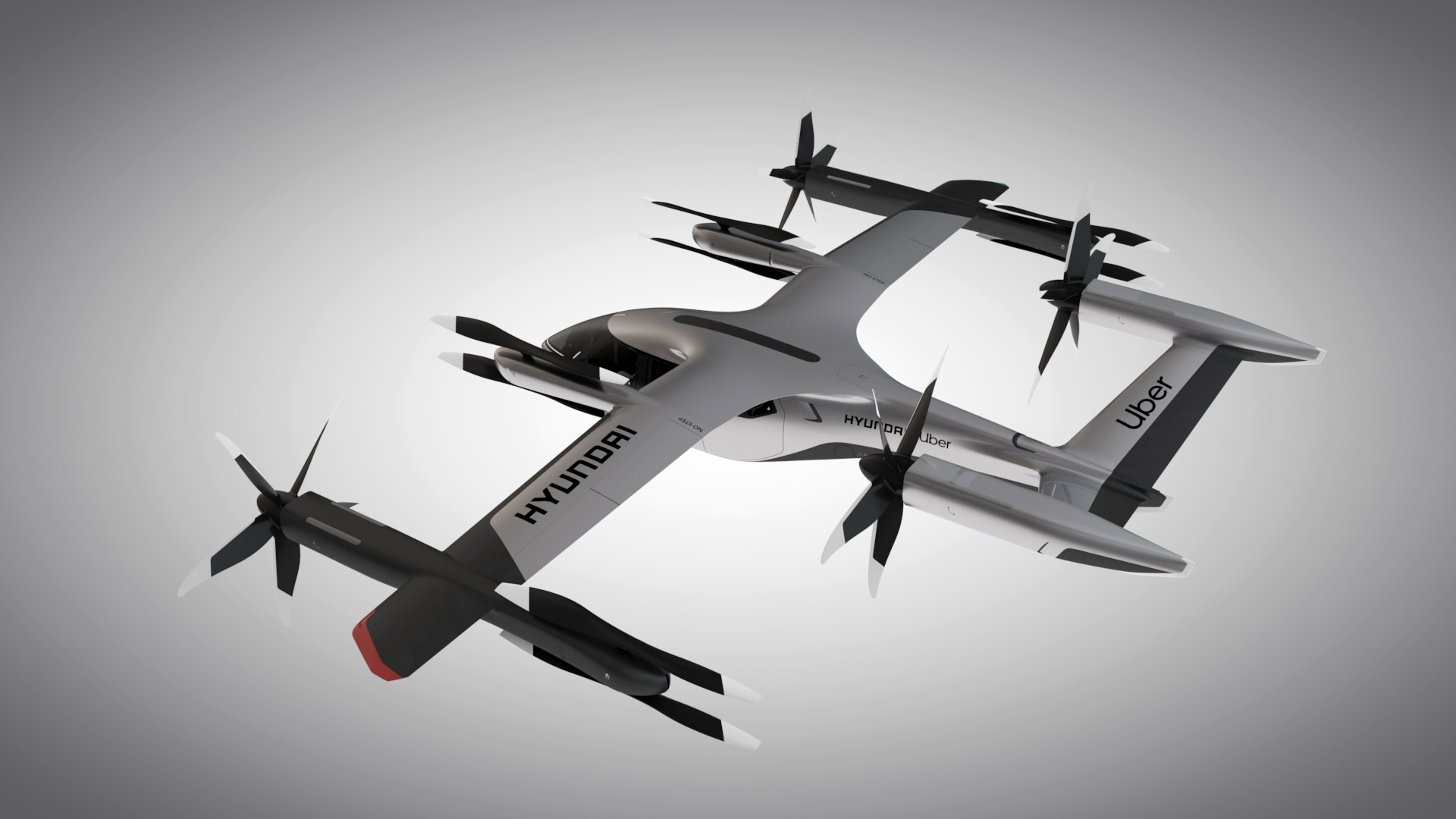
Sandhu says: “We have been inundated with enquiries and our plan for 200 in the next five years is realistic. It’s almost conservative, because if you think about the city and the urban network, the Urban Air Port is like a tube stop or a train station. It of course depends on the city and it depends on the problems we are solving for that city, but certainly I can imagine hundreds for just one city.”
He puts the opportunity in an even greater context: “It’s important to remember that we have a scalable technology, and we can have small Urban Air Ports on rooftops, and we can have them bigger on the ground and we could even have Urban Air Ports that are floating. To build that network, you could easily imagine having 200 just around Greater London.’’
[* Hunter Palmer Global Retail Solutions is a UK-based specialist retail and food & beverage firm. Co-founded by experienced travel retail and food & beverage executives Keith Hunter and Nick Goddard-Palmer, it works with airports, airlines, investors, operators, brands, architects, designers, and hospitality companies looking to develop or improve their commercial offer.]






